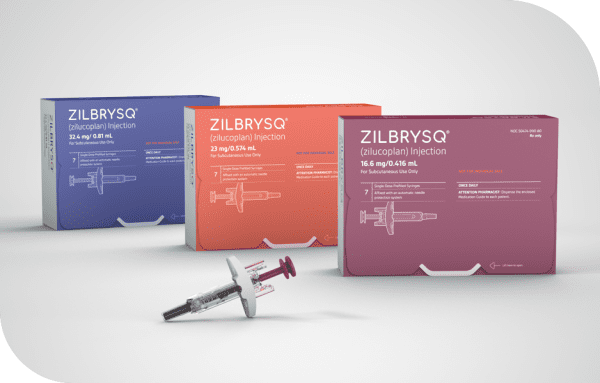Zilucoplan Dosage
Medically reviewed by Drugs.com. Last updated on Apr 8, 2024.
Applies to the following strengths: 16.6 mg/0.416 mL; 23 mg/0.574 mL; 32.4 mg/0.81 mL
Usual Adult Dose for:
Additional dosage information:
Usual Adult Dose for Myasthenia Gravis
- Weight less than 56 kg: 16.6 mg subcutaneously once a day
- Weight 56 kg to less than 77 kg: 23 mg subcutaneously once a day
- Weight at least 77 kg: 32.4 mg subcutaneously once a day
Comments:
- Before starting therapy, baseline lipase and amylase levels should be obtained.
- Healthcare providers who prescribe this drug should enroll in the Zilbrysq REMS.
- Patients should be vaccinated for meningococcal infection according to current advisory committee on immunization practices (ACIP) recommendations at least 2 weeks before administering this drug.
- If immediate therapy is indicated, consider administering the required vaccine as soon as possible and provide patients with antibacterial drug prophylaxis.
Use: For the treatment of generalized myasthenia gravis in patients who are anti-acetylcholine receptor antibody positive
Renal Dose Adjustments
No adjustment recommended
Liver Dose Adjustments
Mild to moderate liver dysfunction: No adjustment recommended
Severe liver dysfunction: Unknown
Precautions
The US FDA requires a Risk Evaluation and Mitigation Strategy (REMS) for Zilucoplan. It includes elements to assure safe use and an implementation system. For additional information: www.accessdata.fda.gov/scripts/cder/rems/index.cfm
US BOXED WARNING:
Serious meningococcal infections:
- This drug is a complement inhibitor and increases the risk of serious infections caused by Neisseria meningitidis.
- Life-threatening and fatal meningococcal infections have been reported in patients treated with complement inhibitors. These infections may become rapidly life-threatening or fatal if not recognized and treated early.
- Meningococcal vaccination (for serogroups A, C, W, Y, and B) should be completed or updated according to current ACIP recommendations at least 2 weeks before administering this drug unless the risk of delaying therapy outweighs the risk of developing a serious infection.
- Monitor for signs of meningococcal infections and evaluate immediately if infection is suspected, as patients receiving this drug are at increased risk for invasive disease caused by Neisseria meningitidis, even if they develop antibodies following vaccination.
- Due to the risk of serious meningococcal infections, this drug is available only through a restricted program under a REMS.
CONTRAINDICATIONS:
- Unresolved serious Neisseria meningitidis infection
Safety and efficacy have not been established in patients younger than 18 years.
Consult WARNINGS section for additional precautions.
Dialysis
Data not available
Other Comments
Administration advice:
- This drug is intended for use under the guidance and supervision of a healthcare professional.
- Patients and caregivers may inject this drug after proper training.
- Inspect for particulate matter and discoloration before administration. Do not use if the solution contains visible particles, is cloudy, or if foreign particulate matter is present.
- Administer this drug into the abdomen, thighs, or back of the upper arms that are not tender, bruised, red, or hard.
- Administration of this drug in the upper and outer arms should be performed by a caregiver.
- Avoid injecting into areas with scars or stretch marks.
- Rotate injection sites for each administration.
- The daily dose should be administered at approximately the same time each day.
- If a dose is missed, administer the dose as soon as possible.
- It is not recommended to administer more than one dose per day.
- The manufacturer product information should be consulted.
Storage requirements:
- Store in a refrigerator at 2C to 8C (36F to 46F) until the expiration date in the original carton. Do not freeze.
- This drug can be stored at room temperature up to 30C (86F) for up to 3 months after removing from refrigerator or until the expiration date, whichever occurs first.
- Protect from direct sunlight.
Preparation techniques:
- Allow refrigerated prefilled syringe to reach room temperature by placing it on a clean, flat surface out of direct sunlight for 30 to 45 minutes. Do not heat or place in microwave.
- Do not return prefilled syringe to the refrigerator after it has been stored at room temperature.
- The manufacturer product information should be consulted.
Monitoring:
- Nervous system: Signs and symptoms of meningococcal infections
Patient advice:
- Read the US FDA-approved patient labeling (Medication Guide and Instructions for Use).
- Meningococcal infection may occur. Seek immediate medical attention if signs or symptoms of infection occur.
- Carry the patient safety card at all times during therapy and for 2 months after the treatment.
- Pancreatitis and pancreatic cysts may occur. Persistent abdominal pain, sometimes severe or radiating to the back, which may or may not be accompanied by vomiting, is the hallmark symptom of acute pancreatitis. Contact your healthcare provider if these symptoms occur.
- It is recommended to inject the full dose of this drug.
More about zilucoplan
- Check interactions
- Compare alternatives
- Reviews (2)
- Side effects
- During pregnancy
- Drug class: selective immunosuppressants
- Breastfeeding
- En español
Patient resources
Other brands
Professional resources
Other brands
Related treatment guides
See also:
Further information
Always consult your healthcare provider to ensure the information displayed on this page applies to your personal circumstances.


